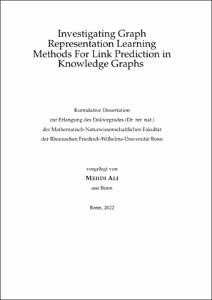Ali, Mehdi: Investigating Graph Representation Learning Methods For Link Prediction in Knowledge Graphs. - Bonn, 2023. - Dissertation, Rheinische Friedrich-Wilhelms-Universität Bonn.
Online-Ausgabe in bonndoc: https://nbn-resolving.org/urn:nbn:de:hbz:5-72809
Online-Ausgabe in bonndoc: https://nbn-resolving.org/urn:nbn:de:hbz:5-72809
@phdthesis{handle:20.500.11811/11122,
urn: https://nbn-resolving.org/urn:nbn:de:hbz:5-72809,
author = {{Mehdi Ali}},
title = {Investigating Graph Representation Learning Methods For Link Prediction in Knowledge Graphs},
school = {Rheinische Friedrich-Wilhelms-Universität Bonn},
year = 2023,
month = nov,
note = {Knowledge Graphs (KGs) have become a fundamental approach to represent structured data and are employed in academic and industrial applications. KGs are used in various machine learning applications, such as question answering, dialogue systems, and recommendation systems. Although real-world KGs contain up to billions of links, they are usually still incomplete, which can severely impact downstream applications.
Link prediction in KGs is the task of predicting missing links and can be performed in a transductive or inductive setting. In the past, a wide range of link prediction approaches have been proposed, encompassing rule-based and machine learning-based approaches. One promising line of research has been link prediction based on graph representation learning methods. In particular, a large number of knowledge graph embedding models (KGEMs) have been proposed and recently, also graph neural network (GNN) based approaches are used for link prediction within KGs. Despite the intensive research efforts in KGEMs, their capabilities are often not transparent. It has been shown that baseline models can obtain competitive results to the state-of-the-art models when configured appropriately, indicating that the performance of a KGEM may not merely depend on its model architecture, but on the interplay of various components. Link prediction within KGs has been investigated mainly within the transductive setting, prohibiting inference over unseen entities. However, lately, inductive link prediction approaches have obtained increased attention since they are capable of predicting links involving unseen entities.
In this thesis, we propose an extensive ecosystem for investigating the performance of KGEM-based link prediction. We used the developed ecosystem to first perform a reproducibility study in which we investigated the reproducibility crisis of KGEM-based link prediction experiments. Second, we performed the most extensive KGEM-based link prediction study in which we investigated whether incremental performance improvements reported for KGEMs can solely be attributed to the model architectures or the combination of the KGEM's components. After providing an in-depth analysis of transductive link prediction within triple-based KGs, we focus on inductive link prediction within hyper-relational KGs. We bridge the concepts of inductive link prediction and hyper-relational KGs and demonstrate that hyper-relational information improves semi- and fully-inductive link prediction. Finally, we demonstrate the effectiveness of knowledge graph representation learning for addressing biomedical applications.},
url = {https://hdl.handle.net/20.500.11811/11122}
}
urn: https://nbn-resolving.org/urn:nbn:de:hbz:5-72809,
author = {{Mehdi Ali}},
title = {Investigating Graph Representation Learning Methods For Link Prediction in Knowledge Graphs},
school = {Rheinische Friedrich-Wilhelms-Universität Bonn},
year = 2023,
month = nov,
note = {Knowledge Graphs (KGs) have become a fundamental approach to represent structured data and are employed in academic and industrial applications. KGs are used in various machine learning applications, such as question answering, dialogue systems, and recommendation systems. Although real-world KGs contain up to billions of links, they are usually still incomplete, which can severely impact downstream applications.
Link prediction in KGs is the task of predicting missing links and can be performed in a transductive or inductive setting. In the past, a wide range of link prediction approaches have been proposed, encompassing rule-based and machine learning-based approaches. One promising line of research has been link prediction based on graph representation learning methods. In particular, a large number of knowledge graph embedding models (KGEMs) have been proposed and recently, also graph neural network (GNN) based approaches are used for link prediction within KGs. Despite the intensive research efforts in KGEMs, their capabilities are often not transparent. It has been shown that baseline models can obtain competitive results to the state-of-the-art models when configured appropriately, indicating that the performance of a KGEM may not merely depend on its model architecture, but on the interplay of various components. Link prediction within KGs has been investigated mainly within the transductive setting, prohibiting inference over unseen entities. However, lately, inductive link prediction approaches have obtained increased attention since they are capable of predicting links involving unseen entities.
In this thesis, we propose an extensive ecosystem for investigating the performance of KGEM-based link prediction. We used the developed ecosystem to first perform a reproducibility study in which we investigated the reproducibility crisis of KGEM-based link prediction experiments. Second, we performed the most extensive KGEM-based link prediction study in which we investigated whether incremental performance improvements reported for KGEMs can solely be attributed to the model architectures or the combination of the KGEM's components. After providing an in-depth analysis of transductive link prediction within triple-based KGs, we focus on inductive link prediction within hyper-relational KGs. We bridge the concepts of inductive link prediction and hyper-relational KGs and demonstrate that hyper-relational information improves semi- and fully-inductive link prediction. Finally, we demonstrate the effectiveness of knowledge graph representation learning for addressing biomedical applications.},
url = {https://hdl.handle.net/20.500.11811/11122}
}






